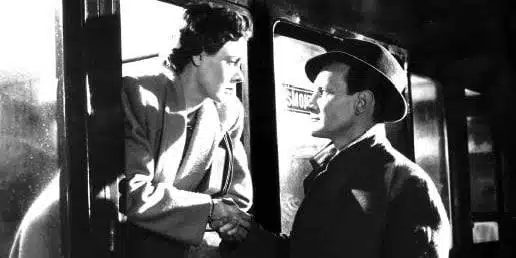
Two strangers meet by chance and strike up a conversation. Then it happens again, and they realize an unspoken connection is there. Both are married and have kids, so there’s little promise of a relationship. A subtle voice inside each person’s brain is suggesting a different possibility, however. They schedule another meeting, and the romance is more direct this time. As proper residents of
’40s England, are they willing to take the plunge and throw their families into chaos? The rational answer is obvious, but an irresistible connection makes it a torturous decision.
Released in 1945, Brief Encounter is a highly regarded adaption of the one-act Noel Coward play Still Life. This early picture from David Lean (Lawrence of Arabia) offers a tight, effective depiction of love in a confining world. Laura Jesson (Celia Johnson) is married to a dull, civilized man and caught in a monotonous routine. Her face is just beginning to show the lines of middle age but looks much older when faced with her uninteresting life. After meeting her new beau, she appears 15 years younger and exudes life and energy. She can now look forward to each Thursday rendezvous in this fun, unpredictable detour from monotony.
The guy is Dr. Trevor Howard (Dr. Alec Harvey), an idealistic romantic who falls for Laura immediately. Their strange first meeting occurs when she gets a piece of ash in her eye. Luckily, he steps up to save her from more eye irritation. Like many new relationships, they bond over a love of “the pictures”, even laughably bad ones like “Flames of Passion”. No need to search for it on IMDb; this is not a real movie. Trevor’s wit and energy are infectious, and it’s easy to see how Laura would fall for him. The duo is having so much fun that love arrives before they know it.
Modern film audiences typically avoid melodramas, so the early scenes might make you expect a tired, dated plot. Certain elements do feel a bit silly, especially Mr. Jesson’s need to wear a suit at all times of the day. But the main story remains sharp and effective today because of its use of universal themes. Who can’t identify with someone who longs to escape the daily routine and take an adventure? Lean barely presents those who might be harmed by this tryst. There’s one early scene with Laura’s kids, and we never meet anyone from Trevor’s family. I expect that a remake today would introduce many sub-plots and supporting characters to raise the stakes (and add humor). That approach would only dilute this film’s powerful simplicity.
Another reason for this success is the near-perfect sense of place, with minimal locations becoming pleasant through repeated use. The best example is the shop at the train station, where colorful figures interact apart from the main characters. Laura and Trevor have key moments at this shop, but the other people aren’t just around to serve that story. They seem to have their own lives beyond what we see on the screen. The exterior scenes in the train station enhance the realism and offer a harsh reminder of the old routine. No matter how exciting their meetings are, there’s always the looming train ride back to nonexistence.
Brief Encounter received three Oscar nominations, which included a well-deserved acting nod for Celia Johnson. Laura is the story’s pivotal figure, and if Johnson wasn’t up to the task, it would become ridiculous. Her character’s guilt leads to the affair’s final resolution, which is hinted at during the prologue. A frequent interior monologue reveals her thoughts as she recalls their relationship. Voiceovers rarely work, but this device isn’t nearly as grating as you might expect. Placing us inside Laura’s head increases the emotional impact and our response to the conclusion. The melodrama feels a bit overdone, but it fails to diminish our interest in this engaging, troubled duo.
